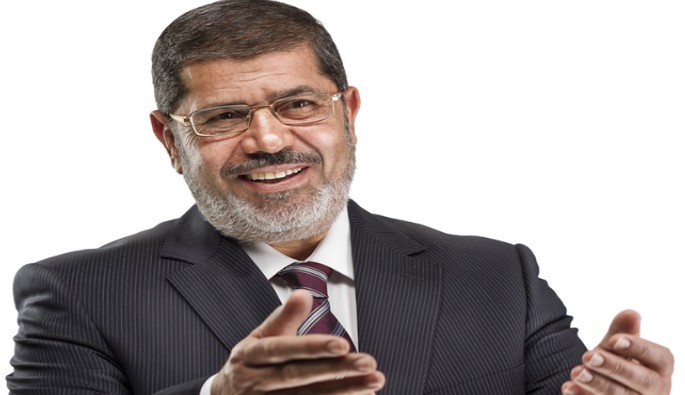It will be the third trial announced for Morsi on separate charges, amid a crackdown on his Muslim Brotherhood movement following his overthrow in July.
Prosecutors claim that Brotherhood, Hamas, Hezbollah and jihadist militants attacked prisons and police stations during the first few days of the revolt against dictator Hosni Mubarak, killing policemen and helping thousands of inmates escape.
Several Hamas and Hezbollah members were in jail and escaped during the unrest.
At least two of the Hamas inmates, including militant leader Ayman Nofal, have been indicted, the prosecution sources said.
A Hezbollah commander named Mohamed Mansur, convicted in 2010 of plotting attacks in the country and who escaped, was also charged.
The other defendants include leaders of Morsi's Muslim Brotherhood, who also escaped from the Wadi al-Natrun prison during the revolt, and prominent Qatar-based cleric Yousef al-Qaradawi.
Morsi had been under investigation for the January 28, 2011 prison break along with Brotherhood members.
He is already on trial for allegedly inciting the killings of opposition activists during his one year in power.
And prosecutors said earlier this week he will also stand trial for espionage involving Hamas.
The latest charges underscore the shift in the Islamists' fortune following Morsi's overthrow.
Egypt's first democratically elected president, Morsi quickly alienated his secular opposition, the police and the military, which overthrew him in July after millions rallied across the country demanding his resignation.
Morsi himself had given a telephone interview to a television station shortly after he escaped prison, saying the guards had left and the inmates walked out of their cells.
He and other Muslim Brotherhood leaders had been rounded up on the morning of January 28, after the Islamists said they would join protests against Mubarak.
The uprising forced the hated interior ministry to withdraw from the streets, and Mubarak resigned on February 11 after three decades in power and handed the reins to the military.
Mubarak, his interior minister and top police commanders were put on trial for the killings of protesters during the uprising. Their defence blamed the violence on the Brotherhood, Hamas and Hezbollah.
Since Morsi's ouster, more than 1,000 people, mostly Islamists, have been killed in street clashes with police, and thousands imprisoned.
Morsi's supporters continue near daily protests demanding his reinstatement, while the military battles an insurgency in the Sinai peninsula that has killed dozens of soldiers and policemen since Morsi's overthrow.
Meanwhile, courts this week dismissed corruption charges against Ahmed Shafiq, Morsi's rival in the 2012 election. A prime minister under Mubarak, he fled the country after narrowly losing to the Islamist.
Shafiq will not stand in presidential elections scheduled for next year if military chief Abdel Fattah al-Sisi, widely popular for toppling Morsi, declares his candidacy.
--------------------------------------------------------------------------------------------
Prosecutors claim that Brotherhood, Hamas, Hezbollah and jihadist militants attacked prisons and police stations during the first few days of the revolt against dictator Hosni Mubarak, killing policemen and helping thousands of inmates escape.
Several Hamas and Hezbollah members were in jail and escaped during the unrest.
At least two of the Hamas inmates, including militant leader Ayman Nofal, have been indicted, the prosecution sources said.
A Hezbollah commander named Mohamed Mansur, convicted in 2010 of plotting attacks in the country and who escaped, was also charged.
The other defendants include leaders of Morsi's Muslim Brotherhood, who also escaped from the Wadi al-Natrun prison during the revolt, and prominent Qatar-based cleric Yousef al-Qaradawi.
Morsi had been under investigation for the January 28, 2011 prison break along with Brotherhood members.
He is already on trial for allegedly inciting the killings of opposition activists during his one year in power.
And prosecutors said earlier this week he will also stand trial for espionage involving Hamas.
The latest charges underscore the shift in the Islamists' fortune following Morsi's overthrow.
Egypt's first democratically elected president, Morsi quickly alienated his secular opposition, the police and the military, which overthrew him in July after millions rallied across the country demanding his resignation.
Morsi himself had given a telephone interview to a television station shortly after he escaped prison, saying the guards had left and the inmates walked out of their cells.
He and other Muslim Brotherhood leaders had been rounded up on the morning of January 28, after the Islamists said they would join protests against Mubarak.
The uprising forced the hated interior ministry to withdraw from the streets, and Mubarak resigned on February 11 after three decades in power and handed the reins to the military.
Mubarak, his interior minister and top police commanders were put on trial for the killings of protesters during the uprising. Their defence blamed the violence on the Brotherhood, Hamas and Hezbollah.
Since Morsi's ouster, more than 1,000 people, mostly Islamists, have been killed in street clashes with police, and thousands imprisoned.
Morsi's supporters continue near daily protests demanding his reinstatement, while the military battles an insurgency in the Sinai peninsula that has killed dozens of soldiers and policemen since Morsi's overthrow.
Meanwhile, courts this week dismissed corruption charges against Ahmed Shafiq, Morsi's rival in the 2012 election. A prime minister under Mubarak, he fled the country after narrowly losing to the Islamist.
Shafiq will not stand in presidential elections scheduled for next year if military chief Abdel Fattah al-Sisi, widely popular for toppling Morsi, declares his candidacy.
--------------------------------------------------------------------------------------------









 Home
Home Politics
Politics











